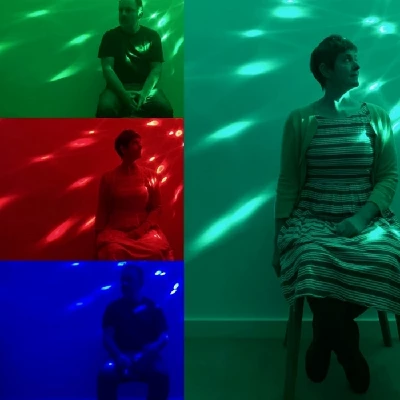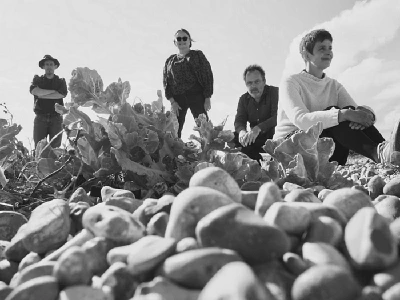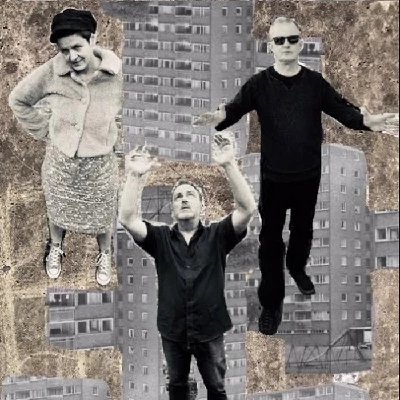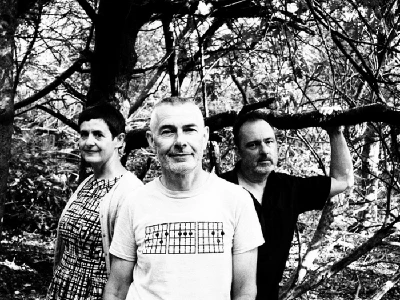published: 14 /
2 /
2021
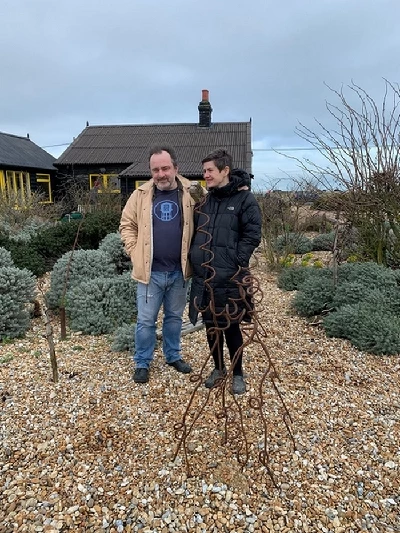
Talulah Gosh, Heavenly and Tender Trap's Amelia Fletcher and Rob Pursey speak to John Clarkson about their current band The Catenary Wires' forthcoming third album and their three other new musical projects, European Sun, Swansea Sound and The Drift.
Article
“When we moved from London, we thought, ‘Okay, this is a good time. We will finally stop doing music. We have done this long enough,’” says Amelia Fletcher in an interview with Pennyblackmusic. “Our intention was to have a new life in the country and not bother with music, but, of course, we have made that decision in the past and it always ends up the same, which is after a little while, we miss it and we can’t help ourselves.”
Vocalist Fletcher and her musical partner, husband, guitarirst and now co-vocalist Rob Pursey have played together since the mid-1980s in a series of iconic indie pop bands, including shambling, singles-only twee pop act Talulah Gosh, the durable Heavenly (who released three out of four their albums on the influential Sarah Records), the short-lived Marine Research and Tender Trap (who released four albums on the also seminal Fortuna! Pop).
While they planned to retire from music after they moved from London to the South East tip of rural Kent in 2013, Fletcher and Pursey have found themselves busier musically than ever.
The Catenary Wires, which they formed initially as an acoustic duo, has expanded into a five-piece band, and will be releasing its third album in May.
In what has been a whirlwind of activity, they have also released this year music with three other projects.
The first of these is European Sun, which is fronted by West Country singer-songwriter/guitarist and Pursey's childhood friend Steve Miles, and to whose eponymous debut album which came out in September Fletcher and Pursey have contributed arrangements and all other instrumentation as well as produced in their own home studio, the Sunday School.
The second of these projects is The Drift, an ambient project which they have formed with local musician and field recordist Darren Pilcher, and who have just released an album 'WEALDEN', which reflects on their native Kent landscape, and across three lengthy pieces features spoken word vocals from American-born but now locally-based poet Nancy Gaffield.
Lastly there is Swansea Sound, which also features Welsh musician Hue Williams. Williams was the frontman in satirical late 80's/early 90's Welsh indie pop outfit The Pooh Sticks, for whom Fletcher regularly contributed vocals, and whose classic single 'I Know Someone Who Knows Someone Who Knows Someone Who Knows Alan McGee Quite Well' provided a hilariously cynical account of the indie scene of the time and its hangers-on. 'Corporate Indie Band', Swansea Sound's debut single which camee out in October builds on this theme, reflecting on the fate of indie bands signed to major labels.
Pennnyblackmusic spoke to Amelia Fletcher and Rob Pursey about The Catenary Wires' forthcoming new album and European Sun, Swansea Sound and The Drift.
PB: The Catenary Wires was initially formed as a duo. Was that from necessity?
AMELIA FLETCHER: It basically was. We started doing The Catenary Wires, me and Rob, not really with any intention for anyone to hear it, but because we had acoustic guitars sitting around, and we thought it would be nice to write some songs, just the two of us, in which we both sang because we had never really done that before.
We weren’t ever intending to play live, possibly never to record, but coincidentally Sarah Records had a big exhibition at the Arnolfini in Bristol in 2014, and they wanted to do a concert with some of the old Sarah bands, and they asked us if we wanted to play, and we thought, “Oh, okay, that is something that is hard to pass up, a trip to play at the Arnolfini.” So. we decided to do that, and then, of course, we got the bug.
For our first album, ‘Red Red Skies’, and to some extent for the second album, ‘Til the Morning’, it was just me and Rob. So, we stayed as a duo until we began work on our new album, which is going to be out next year. After ‘Til the Morning’, we started playing live with Ian Button and Fay Hallam and Andy Lewis, who had produced that album and also the new one, and we decided that was a really amazing bunch of people to be in a band with, and the new album was rehearsed and recorded with them. It is really quite different from the first two albums. Hopefully people will see that it is natural progress and hear The Catenary Wires still in it, but there is lots more instrumentation, lots more vocals and pretty much everyone sings now, not just me and Rob.
PB: You are very busy with The Drift, European Sun and Swansea Sound as well as The Catenary Wires. Why do you think that you are going through such a fervent creative period?
ROB PURSEY: It is partially down to circumstances. European Sun’s Steve Miles has been a friend of mine since we were kids, and we found ourselves playing a couple of songs with him when he came to visit and it went from there. Hue Williams is an old friend of Amelia’s since the days of The Pooh Sticks, and Nancy Gatward was somebody that I met when I was trying to put a poetry festival together. She is a local and had a similar sort of interest in the landscape here to me. It was down to being in touch with people or back in touch with people who were sending sparks.
AF: I think that it is because we are in the countryside and there are not lots of gigs and other things to get in the way. Our kids are also a bit older now and they prefer in the evening to go and hide in their room rather than wanting entertainment via us, so we are left to do other things. We used to do things like watch football and TV and we don’t do that anymore (Laughs). We just do music. I think that we have just realised that is what we enjoy doing the most in our spare time.
RP: Amelia and I have also got much better at recording since we moved and producing stuff ourselves. We are going to start a label soon because for the first time in our lives it feels that up to a point we can do everything.
We can record, we can play, write the songs and make videos. We will be able to put it out ourselves, so in a way it is like living the indie dream (Laughs). We are going to release stuff that we are involved in first, so we will be our own guinea pigs, and then, unless we completely mess it up, we will see if we can then possibly release by other people.
You can achieve a lot more these days because of things like Bandcamp, because of the fact that you can get pretty good mixing software on your laptop, and the fact that there are still enough independent shops and distributors who are prepared to support work that is happening outside the corporate mainstream. Increasingly I think that the more spaces that you can maintain or protect that are outside the corporate mainstream then the better it is for you and the world at large (Laughs). It is partly political on my part, but it is also knowing that you can do all of it on your own. If you can, you should.
PB: What will the label be called?
RP: It will be called Skep Wax and it takes its name from the festival involving Nancy and which we ran last year. We would have done it this year as well, but obviously couldn’t because of lockdown. It was called Words and Music, and we had seven musicians and seven poets taking it in turns to perform at the old barn we have got here which is called the Skep. I like poetry as much as I like music and combining the two in a one-day event in our barn was a mad dream for me. Skep Wax, therefore, comes out of a crumbling old barn in the middle of nowhere (Laughs).
PB: Do you see Swansea Sound as the natural continuation of the Pooh Sticks?
AF: Yes, I do. Rob has written all the songs, but he is very aware of the humour and the kind of perspective on the music industry that The Pooh Sticks had. I think that The Pooh Sticks had the same kind of self-referential thing that Swansea Sound has.
RP: Yes, to some extent because they were similarly satirical. The kind of satirical jokes they achieved were brilliant at the time.
I had written some songs that were too fast and too punky for The Catenary Wires, and we knew that Hue Williams that might be interested in doing some music, and so we sent him one of the songs. All the vocals that he has done so far were recorded in a cupboard in his house in Wales because we haven’t seen him because of lockdown. So, it started as some fun because he was confined and we were confined, but then as soon as he sent them back we were like, “This really works.” It has got more of a life of its own than we expected.
AF: If both we and Hue had not been in lockdown, Swansea Sound may never have happened, but we now more or less have a whole album.
A lot of the things that we have been working on have come out together at once. We first performed ‘WEALDEN’ with Nancy in 2019, but it took until earlier this year to get around to recording it. We also first started thinking about European Sun last year, but it took time to get Steve down here because he has got to come from the other end of the country and to work out all our parts for it.
Swansea Sound has been a lot quicker and has almost queue jumped (Laughs), and The Catenary Wires was likewise. We had actually started recording the new album pre-lockdown, and we continued through lockdown, and quite a lot of the parts were done by the other members of the band in their respective homes. Poor Ian Button, for example, played drums on his fingers on a keyboard because he couldn’t play drums in his flat, so some of the drums on the album are real and others aren’t, but I don’t think anyone would be able to tell the difference. Andy has done an amazing job of mixing it all together, and it sounds like a band in the same room even though it was recorded in four different locations.
PB: You sang as a guest on three of their albums, Amelia. What are your memories of The Pooh Sticks?
AF: It was their band, not mine. I was just the hired hand. I occasionally went to Swansea to record with them or was invited to do a gig with them. I was as entertained by what was going on as I think their audience were, and I really enjoyed the songs. They were kind of stupid but great, or at least initially stupid. Later on they were not so stupid and also great.
It was different for me from anything else that I had done at that stage, and I quite liked their rock and roll antics but I wasn’t very good at them. Hue had this thing when we played live that I was meant to take a lipstick and write something on his bare stomach, which was obviously stupid rock and roll antics, and not at all Heavenly. We would have never done anything like that (Laughs), but I was willing to go along with it. I am, however, really forgetful. At two different gigs I forgot that I was meant to do this, and it ended up with Hue having to come over and thrusting his stomach at me in a “Look what you are meant to be doing” way (Laughs), I was just the worst rock and roll person. It just isn’t in my nature, but I think that probably made it even funnier for the audience.
PB: Is ‘Corporate Image Band’ targeted at anyone in particular or do you see it more as a general statement on things?
RP: It is more of a general statement. We have known quite a few people who have been in bands that have signed major label deals, and it has all gone a bit sour or become soul-destroying. It is not an unsympathetic song, and it is about you start out writing songs and it suddenly becomes like a really awful day job.
With Swansea Sound, the targets are modern targets like Spotify, Google, eBay and Apple, the digital elements that wouldn’t have affected The Pooh Sticks back then, but hopefully it doesn’t come across as too pompously polemic. It should make you smile rather than feel like you are being lectured.
PB: What is your objection to companies such as Spotify and Apple?
RP: The fact that you can transfer things digitally is fantastic, and we use Bandcamp which works really well and creates a relatively civilized relationship between the producer which is us and the consumer who is whomever chooses to listen to our music.
Spotify and Apple are, however, essentially monopolists or would-be monopolists who would attempt to squeeze the life out of any other format and have to dominate completely. It is too late with Google. They have become synonymous with the internet, but it is perhaps not too late with something like Spotify, which if it is allowed to carry on the way it is will eventually monopolise digital music and eventually radio podcasts as well. If you are on the political side of what it means to be in an indie band, you should be aware of this thing that seems very easy and convenient if you are a consumer. Having a Spotify account is really easy and seems great in the same way that going to Tesco’s seems great. You can get lots of cheap chicken, but if you are the chicken farmer or indeed the chicken itself it is pretty crap.
PB: Swansea Sound’s forthcoming single, ‘Indies of the World’, is about this. Is it true that as well as Skep Wax you are releasing it on three other labels across the world?
RP: It is going to come out on four indie labels of the world which is Skep Wax in Britain and Europe, Formosa Punk in Japan, Happy Happy Birthday to Me in America, and Lavender Sweep who did ‘Corporate Indie band’ are going to put out fifty cassettes in Wales. It is partially a way of celebrating the song by having it come out in all these places at once, but it is partially a way of saying that the global pop underground isn’t entirely dead. It will be great to have it come out in all those places as there are indie scenes in all those places, but it is very hard to make an impact abroad unless you are working with someone who come from there.
PB: ‘WEALDEN’ reflects on rural Kent but both pf you and also Nancy, who is American, come from elsewhere. Do you see it as being written from an outsider’s perspective?
AF: Yes, to a degree, but both Rob and I were actually brought up in the countryside, although very different bits of the countryside, Rob near Bristol and me near Oxford. We feel at home in the countryside.
RP: They were kind of similar places to live. ‘WEALDEN’ definitely, however, captures the excitement of discovering something for the first time which you get and when you’re new to a place or a landscape.
AF: The other member of the band, Darren Pilcher, who does all the loops in ‘WEALDEN’, is from here. He has been writing music which has been inspired by the local environment for a while. It was initially a bit more bluesy but when he started working with us we took it down a slightly different route. He sees himself, I guess, as the real linchpin of the band, between being local and coming from elsewhere. Darren says that he really liked listening to Nancy’s writing because it made him think harder about his own landscape and surroundings.
PB: Amelia, you have sung solo before but since Talulah Gosh times you have tended to have at least one other singer in the band. Do you prefer that?
AF: I do. I think that it is partially because having other vocalists on stage just slightly reduces the pressure (Laughs), but it is mostly because I really, really like backing vocals and duets. My favourite music is music that has lots of harmonies going on, particularly old 60’s girl groups and boy-girl duets of which I don’t think that there is enough of in this world. I just think that it is much more interesting than having single voices. If you are Adele, then a single voice is fine, but my voice is not outstanding. I think that what I can do with my voice with others is more interesting than my voice alone.
PB: You have just released ‘A Bout de Heavenly’, a compilation album of Heavenly material. What is on that?
AF: The Heavenly compilation compiles together all our singles. What has happened over the years is that the Heavenly albums are just about available secondhand, but the singles are really hard to get a hold of. We are not that keen in general on re-releasing old stuff, although we have done with Talulah Gosh, but with Heavenly we always wanted to leave it, because we thought that as you can a hold of all four albums of our albums digitally there wasn’t really much point, but a lot of people have said to us, “You should re-release Heavenly stuff because a lot of people are really struggling to get a hold of it,” and in the end we thought that they were probably right, and we should focus on the stuff that was particularly hard to get a hold of and also creating something that wasn’t readily available. Re-releasing an album or re-releasing all the albums didn’t really appeal to us. I wanted to do a best of, but we realised that we would probably have such a row about what we considered best of that might not be the most sensible thing to do (Laughs), and so we decided to do a singles collection.
It has got all the tracks on the singles, all the A sides which we think are amongst our best songs, but also all the B sides which are surprisingly good but you might not have put on a best of album. I think that it really works. It is also done consecutively, so it is literally each single in turn. You can hear how the band has developed in time, and the very early jangle turning into a Riot Grrrly perspective, turning into a more Brit poppy perspective. It has turned into a really nice thing.
PB: PB: What plans do you have for the future and 2021?
RP: There will be a Swansea Sound LP after a couple more singles. and The Catenary Wires LP will be out in May. We will be recording something with The Drift and are talking about working with another vocalist or poet, but the first thing we will do is music. Steve Miles has also written some more songs, so hopefully at some point next year he will be able to come down here and we will record again with European Sun. We hope to be able to play live as well with some of those acts.
PB: Thank you.
Band Links:-
http://catenarywiresband.com/
http://www.facebook.com/TheCatenaryWir
https://europeansun.weebly.com/
https://www.facebook.com/swanseasound/
https://twitter.com/soundswansea
https://thedrift.uk/
Play in YouTube:-
Picture Gallery:-
